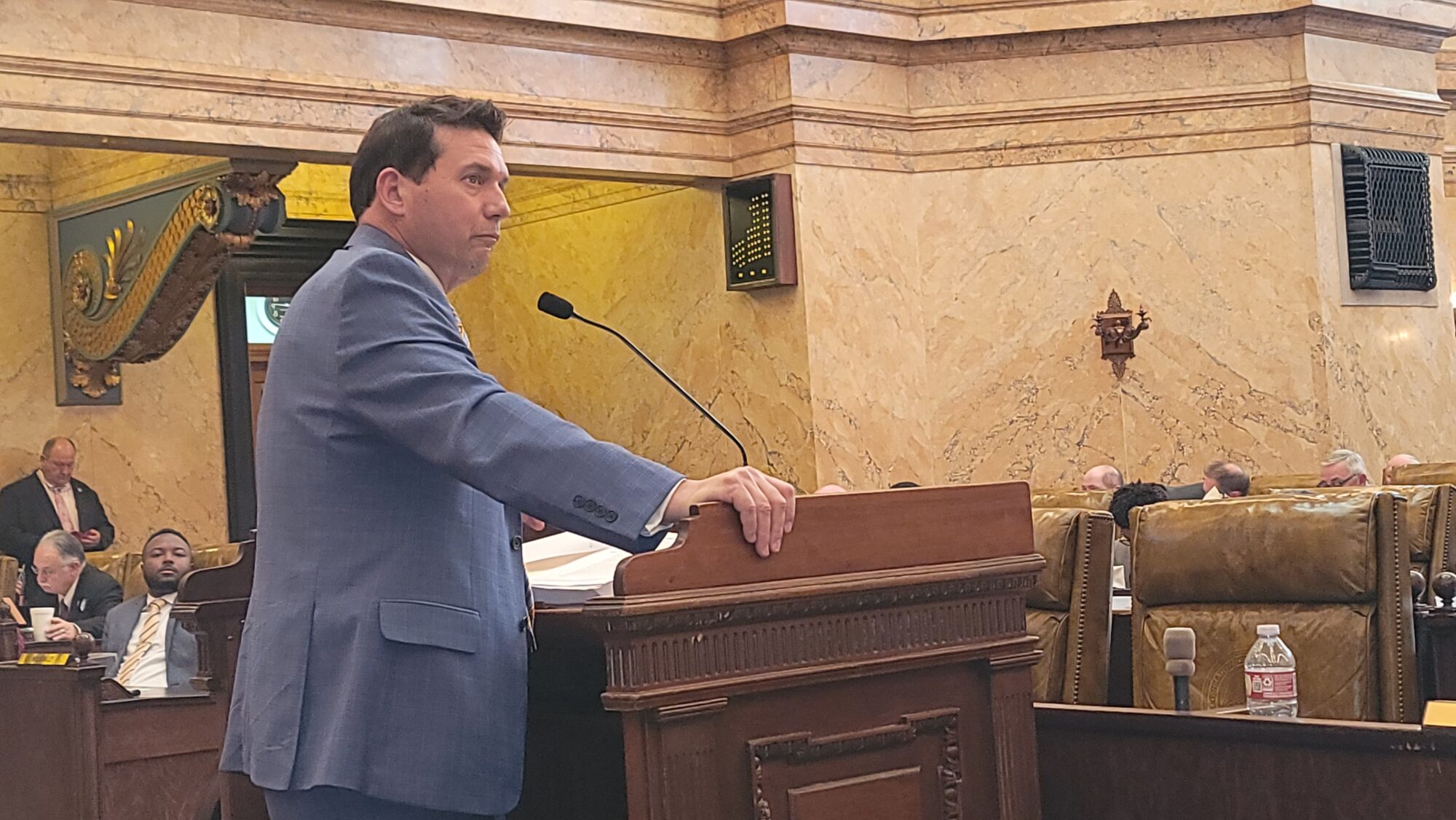
State Representative Lee Yancey presents in the well of the House, Wednesday, March 14, 2024. (Photo by Jeremy Pittari | Magnolia Tribune)
- Products with less than 0.3 percent THC can still be sold in CBD stores, if bill becomes law, but higher level products would be moved to medical cannabis dispensaries.
A bill to restrict the sale of hemp products that contain a high level of THC passed on the floor of the Mississippi House this week. House Bill 1676, known as the “Mississippi Intoxicating Hemp Regulation Act,” received a 77-38 vote to move to the Senate, putting it a step closer to becoming law.
Concerns expressed about the bill focused on how the change might impact small businesses.
State Representative Lee Yancey (R), the bill’s author, presented the legislation to the House, informing members that the measure aims to address the presence of products advertised as being hemp-based, but that actually contain high levels of THC.
The products are being sold at gas stations and businesses that advertise CBD products.
“You may be aware that in your gas stations all across the state and CBD stores across the state, that they have been selling intoxicating hemp. We are differentiating between the types of hemp,” Yancey told the House on Wednesday. “So, hemp and marijuana come from the same plant and things that are hemp are considered soap and rope and CBD and things like that. And things that are considered marijuana were those things that had more than 0.3 percent THC. So, what has happened in our gas stations across the state, those who are selling these products have figured out an ingenious way to sell people something that gets them very high. And so, we have a recreational drug problem in our state right now in our gas stations.”
Yancey said the hemp products in question contain THCa, which converts to THC when heated.
The bill also addresses findings as part of a recent undercover operation conducted back in November where some of the items described were purchased and tested. The results of that operation and the testing were reported to the public in December of last year.
Rep. Yancey told the House that those results found THC levels about 30 times the legal amount for a hemp product and that some contained high levels of pesticides.
“All this is being sold right under our noses to children… principals (are) telling me that kids are buying these things and vaping them all day at school,” Yancey said.
As previously reported by Magnolia Tribune in December, the products were tested by Steephill Mississippi, one of the state’s licensed testing facilities. The items tested contained about 1 to 15 percent THC, close to the percentages legally allowed in the state’s medical marijuana products, which typically range from 15 to 25 percent THC. High levels of pesticides such as bifenazate, chlorantraniliprole, diazinon, myclobutanil, metalaxyl, malathion, permethrins and spinosad were also reportedly found in some of the products tested.
The bill proposes to remove the products with high levels of THC from convenience stores and other businesses that sell CBD products, and instead sell them in medical marijuana dispensaries, where only those with a medical marijuana card can access them.
Moving the products to the medical marijuana facilities will ensure that only people who are 21 or older can purchase them and that they are properly tested for THC and pesticide levels.
The legislation proposes that the products with less than 0.3 percent THC can be displayed in the front of the store and sold to a patron without a medical marijuana card, while stronger products will be kept in the back and require the card.
The products with less than 0.3 percent THC can also still be sold in CBD stores.
Rep Yancey said the Mississippi Department of Health will regulate products with high levels of THC the same way as those offered through the medical cannabis program.
“They would have to go to a medical cannabis dispensary to get the product. They have a part of the dispensary where they could sell these products, then they have another part of the dispensary where if you have a medical cannabis card you go back in there and you can get those products,” Yancey elaborated.
HB 1676 also includes a 3 percent tax on consumable hemp products.
Before a vote was held on the floor, State Rep. Zakiya Summers (D) expressed concern about the impact the bill would have on small businesses currently selling the legal products due to the additional regulations, including the cost to have them tested to ensure they don’t violate the THC levels as the bill lays out.
Rep. Yancey responded that there is no violation to anybody to sell consumable hemp products as long as they contain less than 0.3 percent THC.
“So, the CBD stores the gas stations, they can all sell regular CBD that doesn’t make you high, they just can’t sell the stuff that makes you high, if this bill were to pass,” Yancey said.
While Yancey could not provide actual costs to test the products when asked, he did add that the Mississippi Department of Health determines the cost and amount of product that needs to be tested.
The bill will now go to the Senate for consideration.









